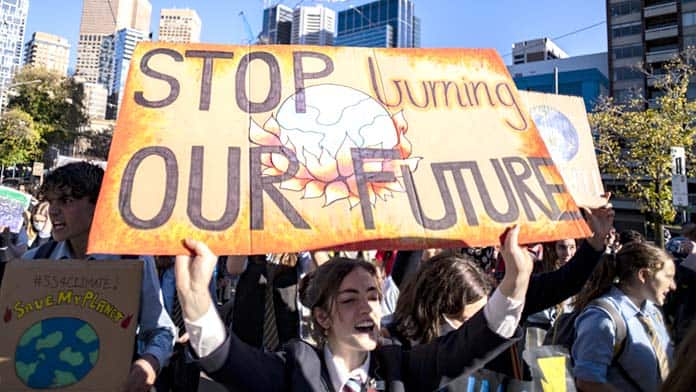Labor’s 43 per cent climate target looks set to pass the Senate in September. The Greens have now agreed to support it despite saying it is based on “weak targets”, with Greens leader Adam Bandt declaring that “the fight to stop Labor’s new coal and gas mines continues”.
Labor’s target is nowhere near enough to avoid climate catastrophe, weaker than even the Business Council’s proposed goal and far below the 75 per cent by 2030 that is consistent with holding warming to 1.5 degrees.
Labor’s legislation is mostly symbolic, simply establishing the target, requiring reports to parliament on progress, and instructing government bodies like Export Finance Australia, the Northern Australia Infrastructure Fund and Infrastructure Australia to take it into account in their decisions.
Albanese is only promising an additional 13 per cent emissions reductions by 2030, with a 20 per cent reduction on the global benchmark 2005 level already accomplished, and a further 10 per cent anticipated from existing measures.
And it gets worse. The target relies on massive use of dodgy offsets, where companies can simply buy their way out of making cuts to emissions.
Independent Senator David Pocock has raised questions about this. The government also needs his vote or that of Jacqui Lambie to get the bill through the Senate.
Labor’s policies to deliver the emissions reductions are still to be finalised. It is relying on private companies to drive the shift to renewable energy, proposing government investment only on new transmission wires to connect power projects to the grid.
A revamped “safeguards mechanism” is also being finalised to drive cuts to emissions in industry, including in manufacturing and mining.
This is a cap and trade or emissions trading system, which requires large industrial polluters to reduce their emissions to meet a set target. However, companies do not actually have to cut emissions—they can also buy offsets or credits from other companies.
The mechanism was set up under the Coalition but despite one in five companies failing to meet their reduction targets, none of them have faced penalties. As a result, emissions have increased in the sector by 7 per cent since the system was introduced. Labor claims it will act to give it “teeth”.
But it still plans to allow use of offsets to deliver 19 per cent of the reductions, according to the Reputex modelling that Labor has released.
It could end up being far more. New fossil fuel projects such as the Scarborough gas hub would drastically increase Australia’s direct emissions, due to gases released during mining. These would also need to be offset.
Offsets a scam
The idea behind offsetting is that companies pay for projects that reduce emissions and store carbon, including tree planting, preventing deforestation, or the capture of greenhouse gases like methane from landfill.
Pocock has raised issues with two specific types of offsets—tree planting to replace timber plantations after logging and the capture of gases from landfill. Both were allowed into Australia’s carbon credit scheme just months before the election.
But the whole offsets scheme has been “largely a sham”, Professor Andrew Macintosh, the former head of the government Emissions Reduction Assurance Committee set up to monitor it, says.
His colleagues investigated 119 tree regeneration projects and found that despite being awarded 17.5 million credits under the scheme, total forest area had hardly increased.
Macintosh and fellow academics Megan Evans and Don Butler wrote that, “Credits have been issued for emissions reductions that were not real or additional, such as protecting forests that were never going to be cleared, growing trees that were already there, growing forests in places that will never sustain them permanently.”
Labor has announced a review. But the problem is not just with the Coalition’s scheme. The whole idea of offsets is bankrupt. Projects that would have happened anyway are too easy to pass off as new offsets. And “offsets” based on storing carbon in vegetation, which can quickly burn or decompose, simply cannot compensate for burning fossilised carbon, formed underground over millions of years.
When there are big profits to be made, companies have an interest in cutting corners and cooking the books.
There is an important role for some activities that currently generate climate credits, like reforestation or Indigenous fire management, which can help rehabilitate ecosystems and mitigate the impact of climate change. But this should be happening in addition to making real reductions in emissions, not as an excuse for more fossil fuels.
Offset schemes should be banned to force companies to actually reduce emissions.
As long as Labor’s target relies on the use of offsets, it will not even deliver a 43 per cent emissions reduction. The future of the planet is more important than corporate profits—it’s time to get serious about tackling the climate emergency.
By James Supple






